
Global Report on Results
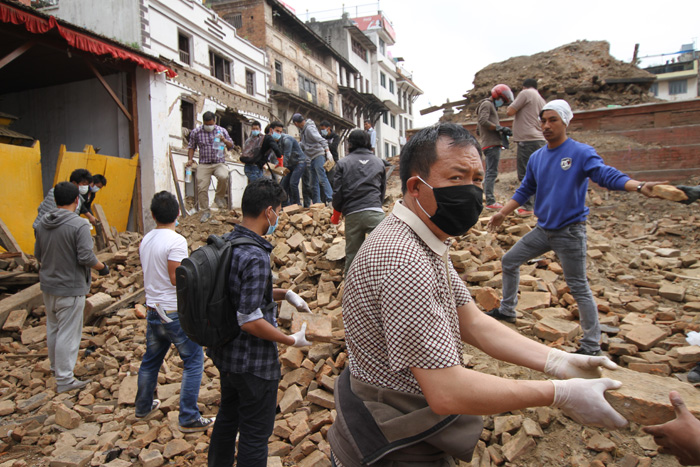
During 2015, NCA and partners provided humanitarian assistance to 2,311,777 people in close to 20 countries, many of whom had faced multiple crises. In 2015, NCA responded to three Level 3 emergencies in Syria, Northern Iraq and South Sudan. In addition, NCA and partners assisted people affected by conflict and natural disasters among other in Afghanistan, Darfur, DRC, Ethiopia, Nepal, Malawi, Myanmar and Pakistan.
20. The L3 designation, the highest level on the emergency scale, indicates to the international community that the situation requires a significant response from the entire humanitarian system.
4.1 IMPROVED RESPONSE CAPACITY
4.2 RESPONDING THROUGH LOCAL STRUCTURES
OVERVIEW OF HUMANITARIAN RESPONSES 2011-2015
Main interventions: The overall goal of NCA’s humanitarian response is to save lives and protect the rights of vulnerable persons before, during and in the aftermath of emergencies. NCA provides life-saving assistance and protection whenever and wherever the needs are most acute. NCA’s expertise and main delivery in humanitarian response operations is the provision of WASH services, often combined other sector responses such as distribution of food and non-food items (blankets, hygiene kits and cooking utensils) and the provision of shelter, education and psycho-social services.
The human and economic cost of disasters caused by natural hazards due to climate change and environmental degradation is higher than before. NCA has increased its capacity for timely response, at scale and with quality services to affected people and communities, and our new global strategy clearly states that NCA’s ambition is to further scale up its humanitarian work.
NCA’s humanitarian WASH cooperation agreement with the Norwegian MFA has enabled NCA to increase its capacity and strengthen global and national WASH coordination mechanisms by for example the seconding of NCA staff to the Global WASH Cluster’s Field Support Team. NCA has also strengthened its collaboration with other ACT Alliance agencies and other humanitarian actors, which has resulted in greater coherence and increased cost effectiveness. The ACT Fast initiative by ACT Alliance Nordic agencies and the Lutheran World Federation (LWF) has strengthened the commitment to jointly respond to large scale global emergencies
Better coordination means fewer gaps and overlaps in humanitarian assistance, ensuring stronger accountability to more people according to the assessed needs of rights-holders. The Core Humanitarian Standards (CHS) and other quality standards and guidelines will continue to be at the core of NCA’s humanitarian work.
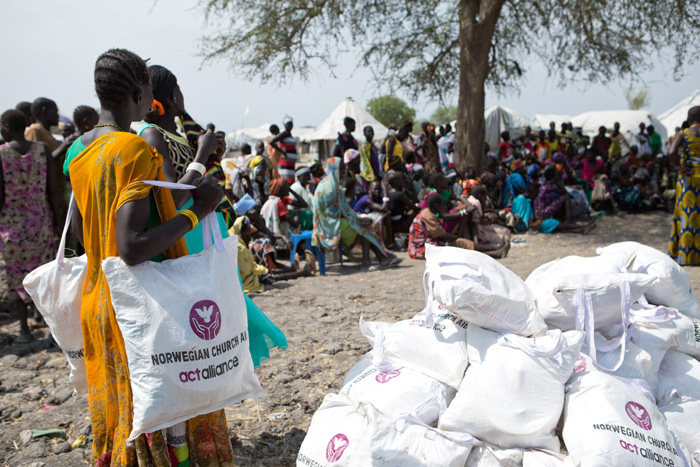
In addition to experiencing in 2015 the worst drought in more than 50 years, Ethiopia has also received more than 200,000 refugees from South Sudan since the outbreak of the conflict in December 2013. Refugees are fleeing from violence and food insecurity, crossing into Ethiopia’s Gambella region. Through the joint program with DCA, supported by ECHO, NCA and its Orthodox and Evangelical FBO partners (IOCC/EOC-DICAC and EECMY-DASSC) responded to sanitation needs in two refugee camps in Gambella, by constructing latrines with hand washing facilities, digging pits and setting up a system for waste disposal, doing hygiene promotion, and constructing communal showers.
Projects were coordinated in close cooperation with UNHCR, the national Ethiopian Administration for Refugee and Returnee Affairs (ARRA), and other organisations. NCA was asked to focus on latrine construction. Partners’ WASH experts also participated in hygiene promotion activities organised by other international organisations. Based on ARRA’s urgent request, NCA and ACT Alliance partners also provided NFIs to cover basic water storage and hygiene needs in camps.
Vital to the success of the response was the mobilisation and involvement of refugees and host community members in the construction and maintenance of their own household latrines, creating a greater sense of ownership and sustainability. The latrine design used by NCA’s local partner was regarded as successful as it was functional and easy to keep clean. Several other actors replicated the design, including large International NGOs. Through cooper ation, sharing and clear roles and responsibilities, the stakeholders benefit from each other’s knowledge, networks and resources. This ensures a more timely, effective and accountable implementation of activities.
In response to the mass movement of about 657,000 Iraqi people into Northern Iraq in mid-2014, NCA opened an office in Dohuk in late 2014. NCA chose to be operational rather than our preferred modality of working with partners, as local NGOs did not have necessary capacity and there was critical need to start a response immediately. Operations started in early 2015 through rapid deployment of Head Office humanitarian and WASH staff, members of NCA’s humanitarian roster, and recruitment of local staff. NCA was allocated two camps to work in, and within one month, was able to meet the basic WASH needs of 28,000 people in the two camps.
Throughout 2015 we have continued to improve the level of service delivery. This mode of operation has served NCA well in Dohuk, where many larger international NGOs have started to downsize their own operations. NCA has expanded the area of its operations to include one new camp in 2015, and in 2016 will include areas where people are returning to their homes.
In 2015 we have tried to identify local partners with WASH expertise, but there are very few with this expertise on the ground. NCA will therefore continue to be directly operational to ensure humanitarian needs are met in a timely manner. Our ambition for 2016 is to set up hygiene groups in the camps, which could form the basis of local self-help groups on their return home.
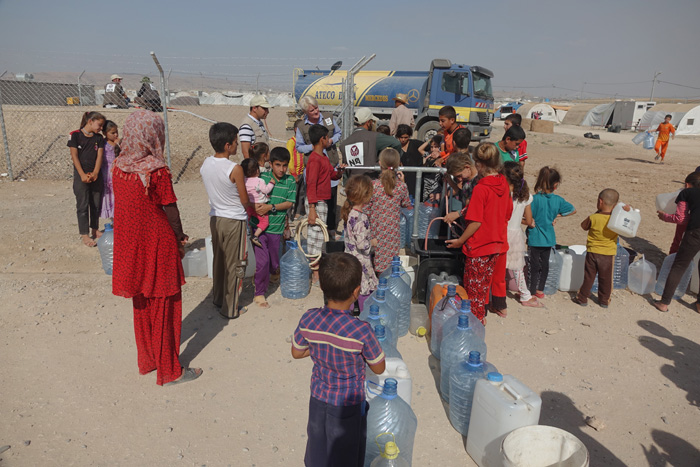
The preferred model for NCA in humanitarian action is to partner with local organisations, since we firmly believe that it is more sustainable and leads to better resilience in communities. NCA’s long-term relationship with local partners, many of them FBOs and members of the ACT Alliance, is therefore a major resource for our humanitarian response capacity. Such relationships have enabled NCA to access hard-to-reach locations and assist people in need with timely, life-saving and dignified assistance in countries such as Mali, Nepal, South Sudan and Syria.
The partnership approach has also continued to enable NCA to fill gaps and better coordinate our response according to the assessed needs of rights-holders. In our experience, local presence enables local actors to be first responders - drawing on established networks and capacity and getting to affected people days before assessment teams from the UN and external humanitarian agencies arrive. An example of this is the local partners’ access to remote areas of Nepal after the earthquake. NCA also sees that local organisations are able to shape programmes in a contextually appropriate and culturally sensitive way. Local organisations are better at knowing communities’ own needs, and they are well-positioned to ensure accountability to affected populations, and respect long-term perspectives.
FBOs in particular are among these first responders to assist people and communities affected by crises and they provide evacuation shelters, volunteers and reinforced infrastructure for humanitarian relief and coordination. During the devastating floods in southern Malawi in 2015, the established networks of long-term partners of NCA became instrumental channels of delivering an integrated flood response. Along with NCA they provided food, agricultural inputs, shelter and WASH services to more than 65,000 crisis-affected people. In South Sudan and Syria as well, faith-structures have enabled NCA to reach the people most in need of relief.
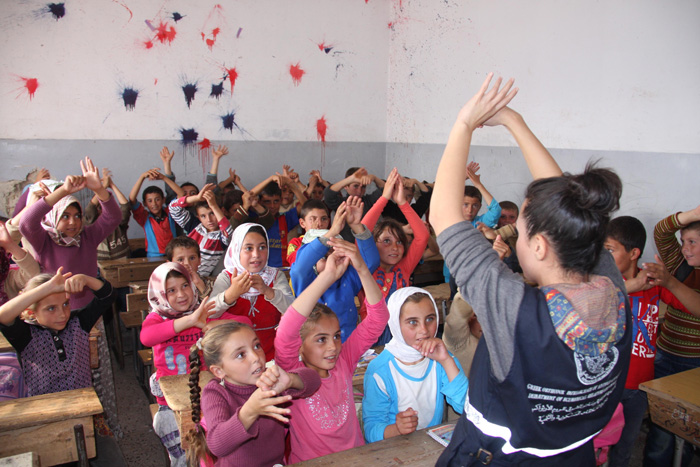
21. The Charter for Change is “[a]n initiative, led by both National and International NGOs, to practically implement changes to the way the Humanitarian System operates to enable more locally-led response”. See charter4change.org
Based on our extensive experience from working with local partners in emergencies, NCA firmly believes that a shift towards more locally-led humanitarian response is needed. We believe investing in local capacity is critical if the resilience and response challenges of the 21st century are to be met, and we want to see local actors being given a larger recognition and role in emergency response. In 2015, NCA therefore signed on to the Charter for Change21, committing us to make concrete changes in our own humanitarian response by 2018, in order to make this change possible.
At the end of 2015, close to 1 million asylum seekers, refugees and migrants had arrived in Greece, most of whom came from conflict-affected countries such as Syria, Afghanistan and Iraq. Many of them continued northwards to other European countries, posing major challenges to Greece and neighbouring countries to cope with the influx. As a result, a record number of people found themselves as refugees and internally displaced people (IDP), living in poor conditions in host communities, or camps where poor public health conditions are a threat to vulnerable groups. NCA and members of the ACT Alliance, together with national FBOs in Greece, Macedonia and Serbia, responded quickly to the urgent humanitarian needs created by this situation. The work was coordinated with the UN and other organisations. NCA focused specifically on vulnerable groups such as children, youth, unaccompanied minors, women, elderly and people with special needs.
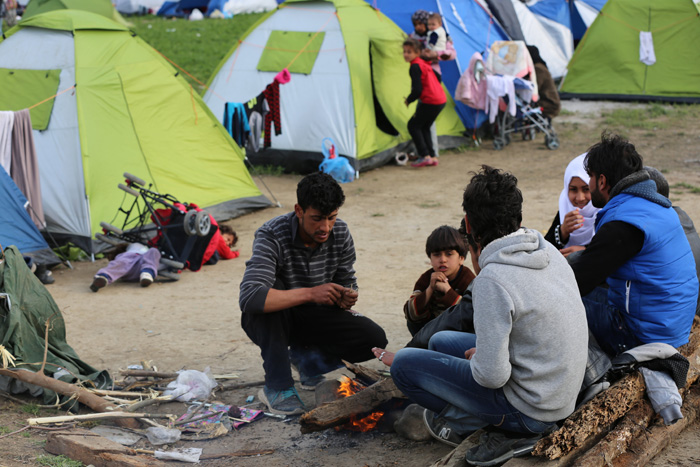
In Greece, NCA partners IOCC and Apostoli of the Greek Orthodox Church, distributed food, NFIs and provided WASH services on the islands of Samos, Chios and Kos. In Macedonia, NCA established partnership with the Macedonian Centre for International Cooperation (MCIC). MCIC installed heaters, improved and expanded latrines and sanitary facilities, and distributed NFIs in refugee transit camps on the borders to Greece and Serbia. In Serbia, NCA was able to start work quickly by building on our long-term relationship with local ACT partner Philanthropy, of the Serbian Orthodox Church. Philanthropy distributed food, hygiene articles and NFIs to refugees passing through Serbia. In addition, NCA cooperated with Ecumenical Humanitarian Organisation (EHO) who distributed sleeping mats, blankets, NFIs, bottled drinking water and hygiene articles.
As the root causes of this refugee crisis – such as the conflicts in Syria and Afghanistan – were far from reaching peaceful and sustainable solutions at the end of 2015, NCA’s and its local partners will continue to respond to the needs of arriving asylum seekers and refugees in 2016.
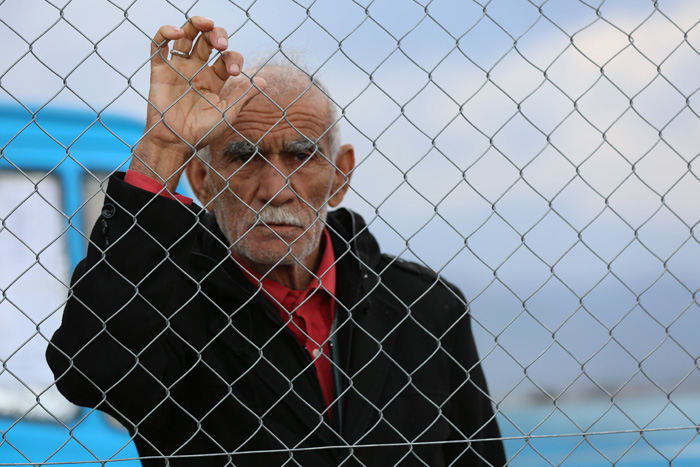
The humanitarian calamity deepened in Syria in 2015. Worsening battles between rebels and government forces resulted in an increasing number of people fleeing each day. Around 1.2 million refugees are now registered in Lebanon and more than 7.5 million IDPs remain in Syria. NCA continued to respond to the crisis in 2015, with WASH services reaching around 18,000 refugees in Lebanon and 780,000 IDPs in Syria. These figures include vulnerable populations in host communities in both countries, and their inclusion reflects NCA’s commitment to conflict sensitive programming. The response adheres to humanitarian principles ensuring provision of humanitarian relief in an impartial manner not taking factors like religion and political affiliation into account. NCA’s response was implemented in partnership with several partners including the International Orthodox Christian Charities (IOCC) and the Greek Orthodox Patriarchate of Antioch and the All the East (GOPA), who have engaged their networks of parishes and volunteers to facilitate access and support to war-affected populations in 10 out of 12 governorates of Syria.
Though the Lebanese government declared at the start of 2015 that the country was not able to accept any more refugees, it made allowances for the Assyrian Christians due to the severe humanitarian conditions they are facing. With a history dating back more than 4,000 years, this Middle Eastern Christian minority is among the most persecuted groups in Iraq and Syria. Many have fled from conflict in Syria and Iraq to Lebanon, which now hosts around 1,400 Assyrian refugee families who reside primarily in private homes. Despite special acceptance from Lebanon, UNHCR’s freeze on new refugee registration means they encounter troubles accessing resettlement programmes and meeting their basic needs.
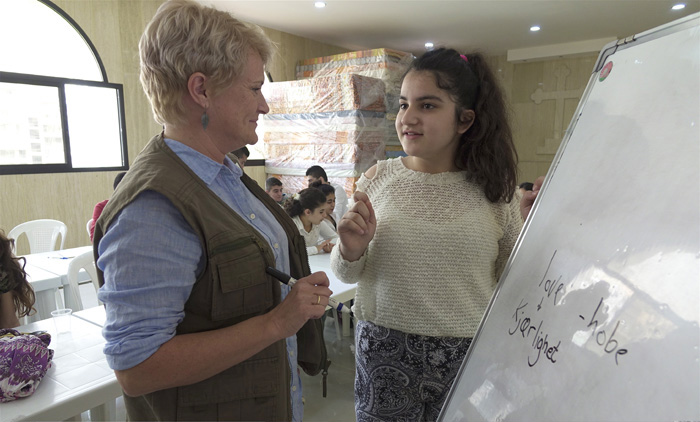
NCA, IOCC and the Assyrian Church in Lebanon have responded to the situation by providing rent assistance to 175 vulnerable Assyrian families, including female-headed households and families with no income. The programme has also supported Assyrian youth to stay in school and not drop-out to look for employment. NCA and IOCC has set up a school in a church in Lebanon’s capital for 100 Assyrian children who have not been admitted to the overcrowded Lebanese schools. It not only offers students like 14 year-old Elsin the opportunity to make up for schooling lost to the conflict in Syria, but also offers a return to normality and the restoration of dreams, “I want to study aircraft engineering”, Elsin proudly told NCA’s General Secretary, who recently visited her school.
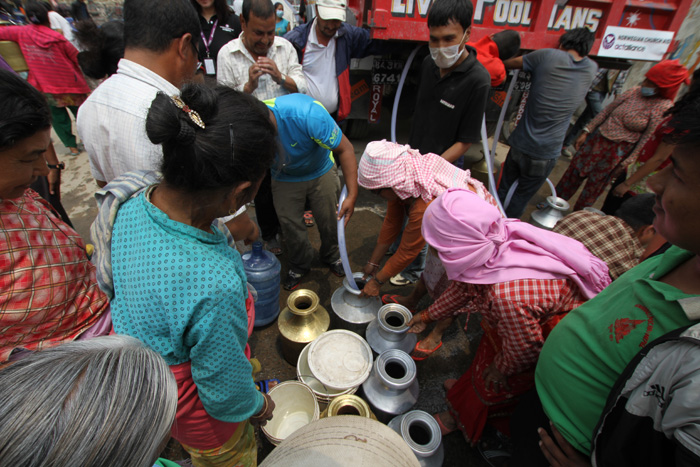
A massive earthquake hit central areas of Nepal on April 25th, 2015, followed by a second large earthquake on May 12th. Around 9,000 people were killed, and the destruction of infrastructure included homes, schools and water and sanitation systems. NCA mobilised an assessment team that reached Nepal within 48 hours of the earthquake, with a mission to assess critical needs and plan an intervention together with our ACT Alliance member DanChurchAid (DCA), who has long-term presence in the country, and DCA’s local partner organisations who were among the first-line responders.
The response focused on the provision of temporary shelter, food, access to safe water and temporary latrines. It was implemented in four districts, including some of the hardest-hit villages. Immediate needs were addressed by NCA and local partners in the emergency and early recovery phase through trucking safe drinking water to residents. Later, in July and August 2015, NCA’s intervention provided earthquake-affected communities with access to safe drinking water through the construction of a new pipeline replacing one destroyed during the earthquake. The new pipeline provides people with up to 30 litres of safe water per day. This is a significant improvement to the situation prior to the earthquake where residents only had limited access to drinking water.
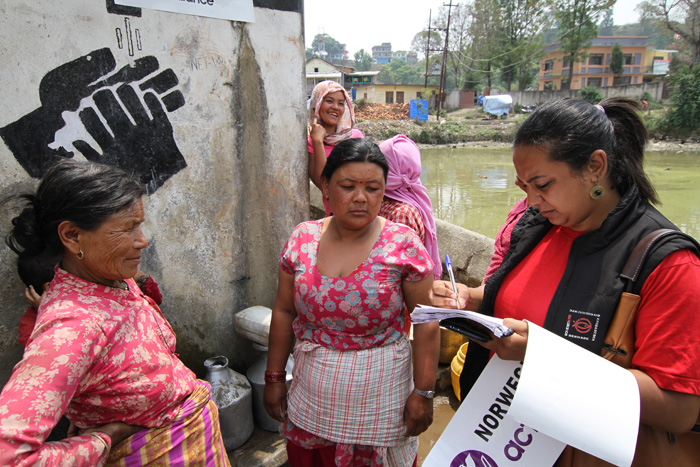
This result was achieved through a successful publicprivate partnership between NCA, DCA, local partner FSCN, Kathmandu Valley Drinking Water Limited, Bungamati Temporary Home and Reconstruction Committee and the private supply company Gautam Construction Suppliers. FSCN played a key role in facilitating the involvement of the local community and linking them to the other stakeholders. They were also instrumental in ensuring the approval of the new water pipeline from the local Department of Roads, largely through mobilising people from the local community. Testing of water quality has shown that the cleaning filter installed is functioning properly.
NCA technical staff played a pro-active role in this project both by facilitating close coordination between relevant actors, and through participating in joint assessments and on-site training of local partner staff during joint monitoring visits. NCA also played an active role as a participant in the cluster forum for coordination of WASH activities after the earthquake.
Next Chapter: 5. Advocacy for Global Justice
Back